When night falls, silence can awaken a restlessness that’s hard to control. Night anxiety doesn’t just disrupt sleep—it steals peace, drains energy the next day, and creates a cycle that’s difficult to break. I’ve felt firsthand how racing thoughts can turn minutes into hours and transform rest into struggle.
The good news is that guided meditation holds real power to calm the mind and offer relief. By creating a space of presence and comfort, techniques like mindfulness and conscious breathing help the body understand it’s safe—and that it’s okay to rest. In this guide, I share proven methods to turn restless nights into true moments of recovery.
If you carry the weight of difficult nights or are seeking alternatives to sleep well again, this guide can transform your routine. I’ll show you how meditation can be the first step toward peace of mind and a return to complete rest.
What Is Night Anxiety: Why the Mind Won’t Shut Down
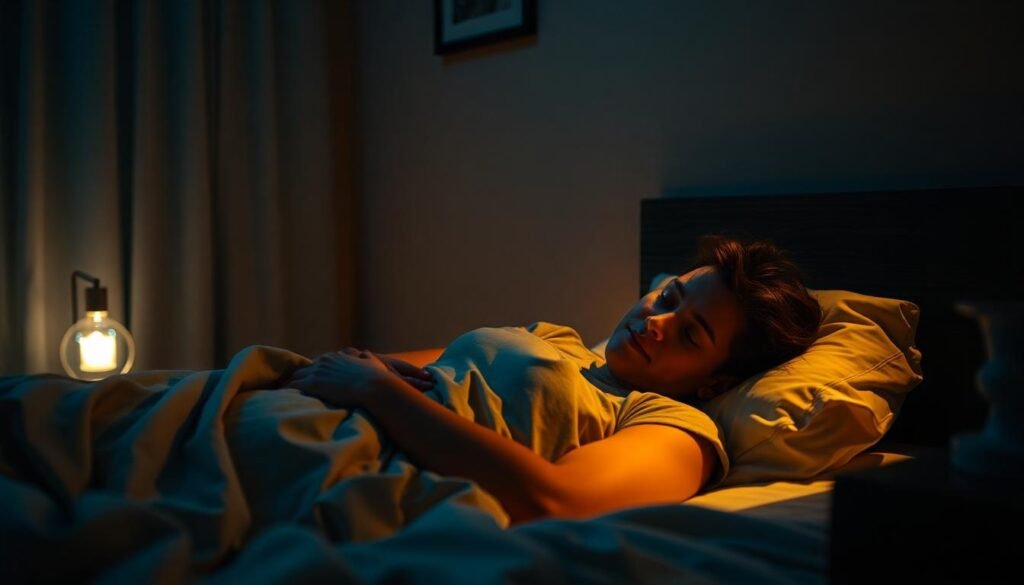
At night, the body asks for rest, but for those struggling with night anxiety, the mind stays in overdrive. I know what it’s like to feel physically exhausted, lie down, and still fight a silent battle against racing thoughts and worries that just won’t go away. The sensation of not being able to “switch off” becomes so routine for many that it robs us of peace when we need it most.
Common Symptoms of Night Anxiety
Our nights often reveal anxiety through clear signs—not just racing thoughts. In my own experience, and from what many others report, here are the most common symptoms:
- Restlessness when lying down, as if finding a comfortable position is impossible
- Trouble falling asleep, even after a long, tiring day
- Frequent awakenings or waking hours before the alarm
- Morning fatigue, as if sleep didn’t fulfill its role
Sometimes the body reacts with shallow breathing, a racing heart, or needing to use the bathroom several times during the night. Chest pressure, sweaty hands, or constant muscle tension are also common—all of which directly affect sleep quality.
Most Common Causes in Daily Life
Modern life demands a lot from us and brings an overload of stimuli that intensify anxiety at nightfall. The causes are often linked to daily situations, such as:
- Stress at work, tight deadlines, or family conflicts
- Prolonged screen use before bedtime, like phones or TVs in the bedroom
- Caffeine consumption late in the day
- Financial worries, internal pressure, and “what do I need to fix tomorrow?” thoughts
- Lack of a sleep routine, irregular hours, and noisy environments
All of this builds up, and when you finally pause, your mind takes advantage of the silence to replay every detail of the day. It’s like the brain only feels free to think when everything is quiet—but instead of relaxing, it becomes hyper-alert.
Impacts on Body and Mind
Sleep-deprived nights come at a cost. The body misses necessary rest, which shows up in several ways:
- Low energy and productivity throughout the day
- Trouble concentrating, increased mistakes, and memory lapses
- Reduced creativity, focus, and even empathy
- Greater irritability and constant feeling of being “on edge”
Physically, the risk is even higher. Chronic poor sleep disrupts hormones, increases the risk of high blood pressure and heart disease, and weakens the immune system. The growing fatigue affects mood, relationships, and even self-confidence.
The mind, in turn, becomes overwhelmed. Nighttime anxiety becomes a cycle where the fear of not sleeping fuels the problem, creating a vicious loop that’s hard to escape alone.
Real-Life Examples from Everyday Situations
It’s very common for some day-to-day events to trigger nighttime anxiety. Here are a few real examples:
- Receiving a work email late at night and being unable to stop thinking about your reply
- Watching violent or negative news before bed and having a panic episode
- Replaying the day’s decisions and overthinking every small mistake
- Feeling physically tired but mentally reviewing the next day, past conversations, or imagined scenarios
- Worrying about finances or a loved one’s health in the quiet darkness
These episodes show how night anxiety often arises from ordinary routines—small, unnoticed during the day, but magnified when the room goes silent.
Night anxiety isn’t just about poor sleep; it’s about a mind and body that can’t relax. Without intervention, the problem grows and affects every area of life—physically and emotionally.
Meditation in Practice: Techniques That Work to Calm the Night
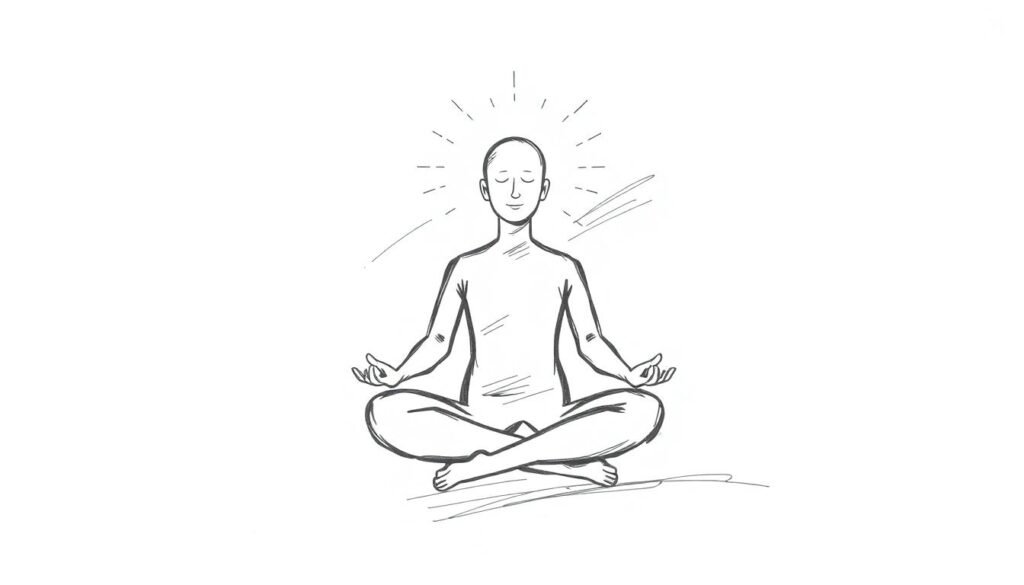
When anxiety strikes right as you’re trying to fall asleep, willpower alone won’t help. That’s when specific techniques become essential to quiet the mind and relax the body. I’ve tried them, and they work—the key is keeping things simple and respecting your pace. Below are proven ways to use meditation to ease nighttime anxiety.
4-7-8 and Diaphragmatic Breathing: Step-by-Step, Benefits, and Signs It’s Working
When lying in bed and thoughts won’t stop, breathing becomes your best ally. The 4-7-8 technique is simple and can be done right there in bed, with eyes closed and body relaxed. Picture it like this:
- Rest your back comfortably on the mattress, relax your shoulders, and gently place your hands on your belly
- Inhale through your nose for a count of 4, letting your belly rise
- Hold the breath gently for 7 seconds. Let that stillness happen
- Exhale slowly through your mouth, as if blowing out a candle, for a count of 8. Let your belly fall
Repeat this cycle four times. In just a few minutes, I notice my heartbeat slowing and shoulder tension easing. Diaphragmatic breathing—where your belly expands instead of just your chest—brings in more oxygen and signals safety to the brain. Signs it’s working include:
- A sensation of heaviness in the body, indicating relaxation
- A warm or tingling feeling, especially in hands and feet
- Racing thoughts begin to lose momentum
- Some people yawn or feel their eyelids get heavy
This is your green light to continue or move to another technique. The secret is to practice slowly, focusing only on the next inhale and exhale.
Mindfulness Meditation and Present-Moment Awareness
The mind tends to race into “what ifs” right when it’s time to sleep. With mindfulness, I learned to acknowledge these thoughts without fighting them—just observing. Simple exercises work well while lying down with dim lighting:
- Briefly focus on the sensations of your body resting on the mattress—feel the weight of your feet, your legs relaxing, the sheets on your skin
- When a thought appears (like a work problem), simply label it “thought” and return to your body or breath
- You can also notice the surrounding sounds: distant traffic, the room’s silence, or the soft sound of your breathing
In daily life, practicing mindfulness can be as simple as paying full attention while brushing your teeth or during a shower, feeling the water run over you. At night, I use the same principle: I “watch” thoughts pass across my mind’s screen without chasing them. This takes power away from anxiety and brings me back to the present.
Progressive Muscle Relaxation to Slow the Body
An anxious body stays on alert. Progressive muscle relaxation teaches your body to release tension, one step at a time. I always start with the feet and move upward to the face:
- Lie down with your eyes closed and notice your body
- Tense your feet tightly for 5 seconds, then release and feel the difference
- Continue with your calves, thighs, and glutes—tighten each group for a few seconds, then relax
- Move on to your abdomen, chest, arms, hands, and finally scrunch your face, then let go
As I relax each part, I feel a growing lightness. It’s as if every muscle slowly melts into the bed. My body warms, my heart rate drops, and my mind starts slowing down. Common sensations during this practice include:
- Legs and arms feel heavier against the mattress
- A subtle warming or soothing heat in the limbs
- A sense of “melting,” like it’s hard to open your eyes afterward
This doesn’t have to be perfect. The key is to feel each muscle group as you tighten and release—at your own pace.
Positive Visualization: Creating Calming Mental Images
Imagining peaceful scenes can transform your night. The brain doesn’t distinguish much between reality and imagination—use that to your benefit. It’s like a bedtime story for adults.
Start by closing your eyes and picturing a comforting place. It could be a beach with ocean waves, an open field with soft wind, or a childhood room that felt safe. Use all your senses:
- Smell the sea breeze or freshly cut grass
- Feel the sun on your skin or soft sheets around you
- Hear the rustling of leaves or soft background music
With each breath, add comforting details—like a warm blanket or a soft lamp glow—and let yourself settle deeper into the scene. My racing thoughts slow, my breath deepens, and my body begins to truly rest. For a few minutes, it feels like I’m really there, and safety washes over me.
If you want variety, imagine a walk through a quiet forest, a hammock between trees, or a warm bath before bed. The important thing is to choose imagery that brings comfort effortlessly—feeding the mind peace until sleep arrives.
Habits and Routines to Improve Deep Sleep
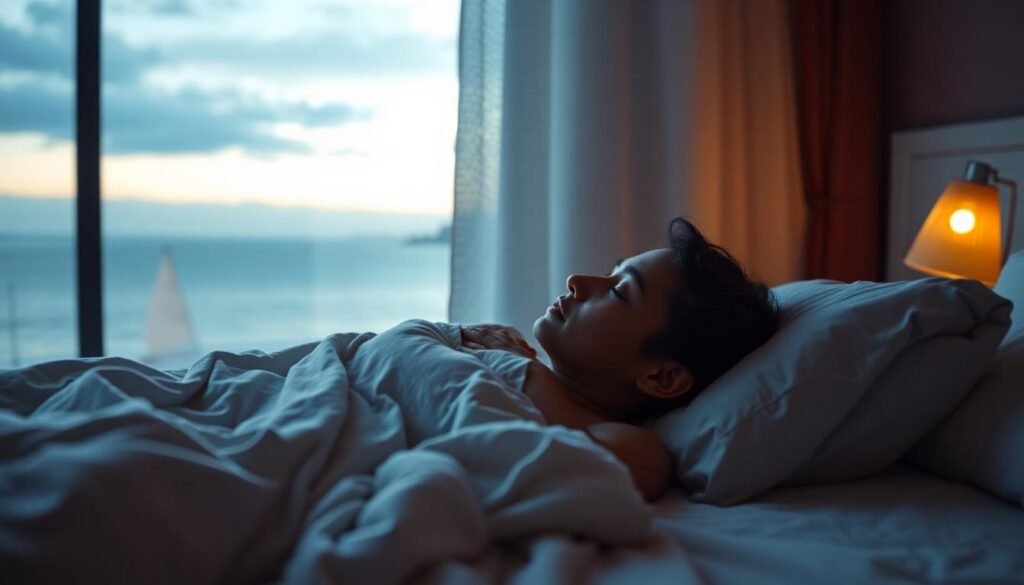
That feeling of peace when your head hits the pillow isn’t luck—it’s the result of choices made throughout the day and evening. Deep sleep, the kind that truly restores body and mind, depends not only on meditation techniques but also on building a routine that prepares the body to relax. Once I added small rituals and adjusted my environment, I noticed a major improvement in my sleep quality—my meditation practices became more effective, and I woke up feeling refreshed.
Evening Routine: Small Changes, Big Impact
The body loves predictability. Having a consistent bedtime and wake-up time—even on weekends—taught my body to expect sleep at the right time. This regularity helps regulate my internal clock and makes me feel naturally tired in the evening.
I created a small routine that signals to my brain that sleep is near:
- Dim, soft lighting at least one hour before bed—this helps increase melatonin production
- A warm shower to relax the muscles and wash away the stress of the day
- Light reading—no negative news or social media
- Calming music or relaxing nature sounds like rain or ocean waves
Repeated daily, these actions make a real difference. They prepare the brain like a theater dimming the lights before the play begins—slowly, everything gets quiet and the body knows it’s time to shut down.
Your Room, Your Sanctuary: Environmental Control
Your environment directly affects sleep quality. Once I turned my bedroom into a sleep-only space, I stopped viewing my bed as just another spot in the house.
Here are the main changes that turned my bedroom into a true sanctuary:
- Comfortable temperature: I adjust the air conditioner or crack a window to keep it between 64–72°F (18–22°C)
- Blackout curtains and soft lighting: Deep darkness boosts melatonin; even small lights can disturb it
- Silence or white noise: When the neighborhood is noisy, I play rainfall or fan sounds to mask it
- Breathable, cozy bedding: Light fabrics prevent sweating and discomfort
- No electronics: My phone never stays on the nightstand, and the TV is turned off well before bed
The idea is simple: the fewer the stimuli, the easier it is for the brain to unplug.
Evening Nutrition: Lightness is Key
Food is fuel—and at night, your body asks for gentleness. I noticed better sleep when I started choosing lighter meals in the evening.
Here are a few things that help:
- Avoid caffeine and alcohol after 6 p.m.—tea, soda, coffee, and chocolate can disrupt or lighten sleep
- Eat a light dinner—soups, salads, lean proteins, and sautéed vegetables work best
- Include calming options—chamomile or fennel tea relaxes, and banana or oats help boost serotonin, the sleep-friendly hormone
- Avoid large portions close to bedtime—heavy meals make me wake up feeling groggy and restless
Being mindful of evening nutrition directly improves both sleep duration and quality.
Gentle Exercise: Move to Sleep Better
The body needs movement to feel a healthy kind of tiredness. I’ve noticed that on days without physical activity, sleep comes more slowly and feels lighter.
The secret is to match the intensity:
- Evening walks help slow the body down
- Stretching or relaxing yoga prepares the muscles and mind to wind down
- I avoid intense workouts near bedtime—they can overstimulate the body
Regular movement also regulates your circadian rhythm and enhances the impact of nighttime meditation.
Sleep Hygiene: Protect Your Rest
Sleep hygiene isn’t just about cleanliness—it’s about removing things that disturb rest. I stick to simple rules that transformed my relationship with sleep:
- Use the bed only for sleeping or intimacy—no phones, TVs, or laptops
- If I can’t sleep within 20 minutes, I get up to avoid associating the bed with anxiety
- Keep work-related items out of the bedroom—no agendas or documents
- Turn off all lights and avoid visible digital clocks—they trigger anxious clock-watching
Over time, the routine reinforces itself. Now, just lying down is enough for my body to respond with sleepiness.
Small Changes, Big Ripple Effect
These habits form a strong foundation that allows meditation to truly help with night anxiety. Everything connects: a calm environment, a cared-for body, and a peaceful mind. I felt the shift when I stopped leaving my sleep to chance and started nurturing it from the moment I wake up.
If you want deeper rest, treat self-care as a path, not a destination. By adjusting your routine, surroundings, diet, movement, and sleep rituals, you amplify the benefits of meditation—and wake up ready to fully live.
When to Seek Professional Help and Extra Support
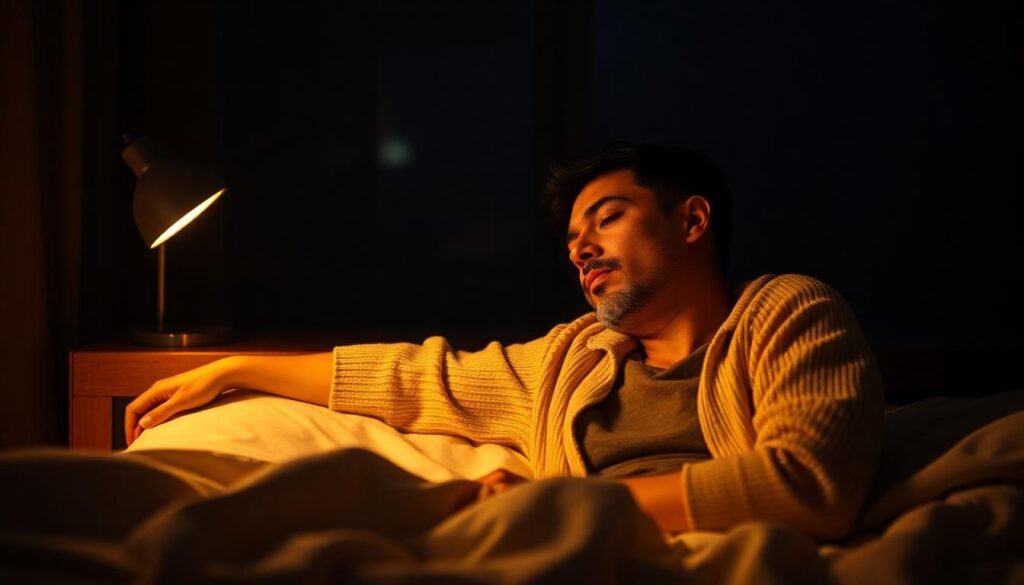
Even after trying breathing techniques, meditation, and improving your routine, night anxiety can still persist. Sometimes we can’t handle everything on our own. Your body and mind may be asking for help—and seeking professional support is an act of courage, not weakness. Recognizing this moment is crucial to shifting gears and regaining control over your sleep.
Warning Signs: When Techniques Aren’t Enough
It’s common to think we can “push through,” but certain signs show that it’s time to stop and ask for help. They show up in the body, emotions, and daily life—often in persistent ways. Pay close attention to these indicators:
- Frequent sleep disruptions, with difficulty falling back asleep even when tired
- Excessive worrying, spirals of negative thoughts as soon as you lie down
- Repeated physical symptoms at night—racing heart, sweating, shortness of breath, or muscle tension that doesn’t ease with relaxation
- Mood changes like irritability, sadness, or helplessness, especially after multiple bad nights
- Constant lack of energy or focus, affecting work, studies, or relationships
- Feeling emotionally drained even without big changes in your routine
If these signs persist for weeks or worsen over time, affecting your quality of life, it’s time to seek a supportive and professional perspective.
The Value of Therapy and Medical Guidance
The first time I sat in front of a psychologist, I felt a mix of fear and relief. Talking to someone who truly understands—without judgment—opens space to view the problem differently. Therapists use tools like Cognitive Behavioral Therapy (CBT) to identify distorted thinking patterns and build personalized strategies. I learned to spot triggers, challenge automatic beliefs, and gradually reclaimed restful sleep.
Some people also benefit from psychiatric care. A psychiatrist can assess whether medication is needed, help manage intense symptoms, and ensure safe, responsible treatment.
Often, the combination of therapy and psychiatry brings quicker, more consistent results—especially if other factors like depression, panic disorder, or other mental health issues are present.
When to Seek Immediate Support
Meditation and self-care are powerful allies—but they don’t replace specialized help in certain situations:
- Anxiety attacks that become frequent and intense, making you feel out of control
- Self-sabotaging thoughts, deep negativity, or a loss of joy in activities you used to enjoy
- Drastic behavior changes: isolation, major changes in appetite, or increased use of alcohol or coping mechanisms
- A family history of serious mental health or sleep disorders—this warrants extra attention
In these moments, seeing a psychologist or psychiatrist is a form of self-care. They’ll help build a customized action plan and guide you through the process, adjusting strategies to restore restful nights and clear, balanced days.
The Positive Impact of Professional Support
Swapping the weight of loneliness for professional support can change everything. I’ve witnessed—and lived—that shift. The right help breaks the cycle of anxiety, bringing relief and renewed hope. Therapy isn’t just “talking about problems”—it’s discovering new paths where before there were only dead ends.
Medical care also opens doors to complementary tools and, when necessary, temporary medication—without guilt or stigma. Each supported step builds internal confidence and real progress.
Little by little, sleep returns. With extra support, your mind learns to relax again, your body responds better, and your nights shift from struggle to true rest. Seeking help is an investment in your life, your health, and your freedom—a decision you’ll never regret.
Conclusion
Restful nights aren’t a distant dream. With small changes, meditation techniques, and new routines, you can build a lighter relationship with sleep and anxiety. When I committed to simple rituals like mindful breathing and muscle relaxation, I noticed my mind slowing down day by day.
Embracing each step, celebrating progress, and respecting your own limits makes all the difference. Nighttime self-care isn’t an obligation—it’s a gift I give myself. Invite yourself to try: a warm bath, a few minutes of guided meditation, and a bedroom turned into a sanctuary are the seeds for gentler nights.
May you choose to care for your night today. With each small action, your body learns to relax, and your mind finds a safe place to rest. Thank you for dedicating these moments to yourself. If this guide resonated with you, share your experience and encourage others to seek the same relief. Peace and deep sleep are within reach—a gentle routine away.
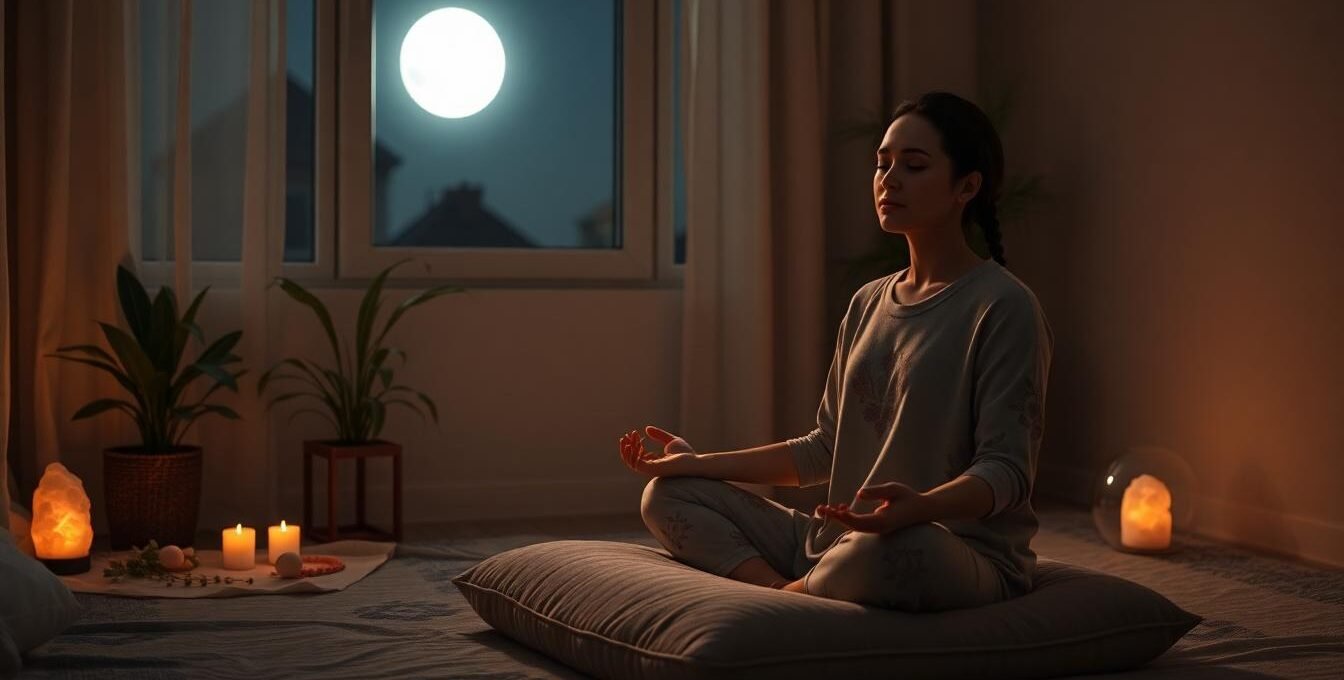

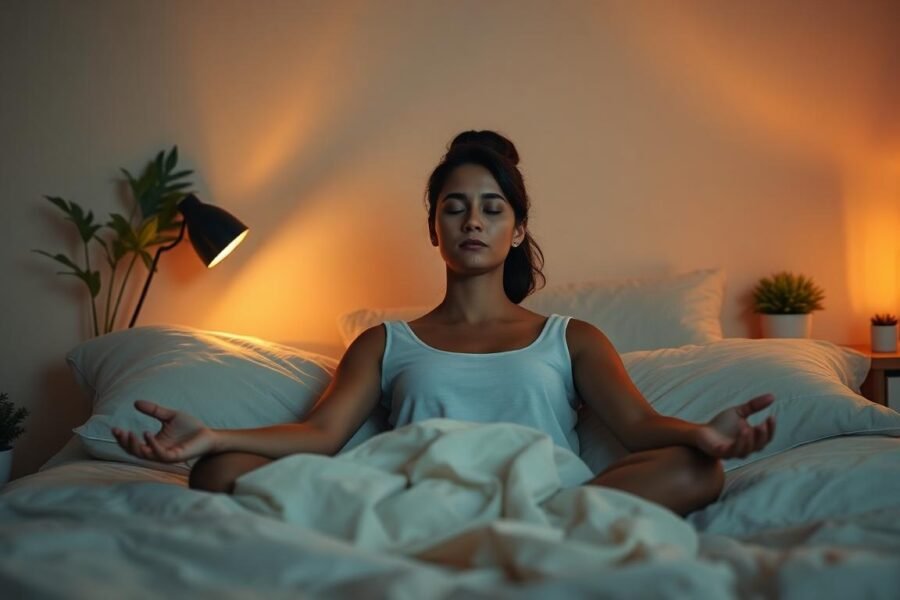
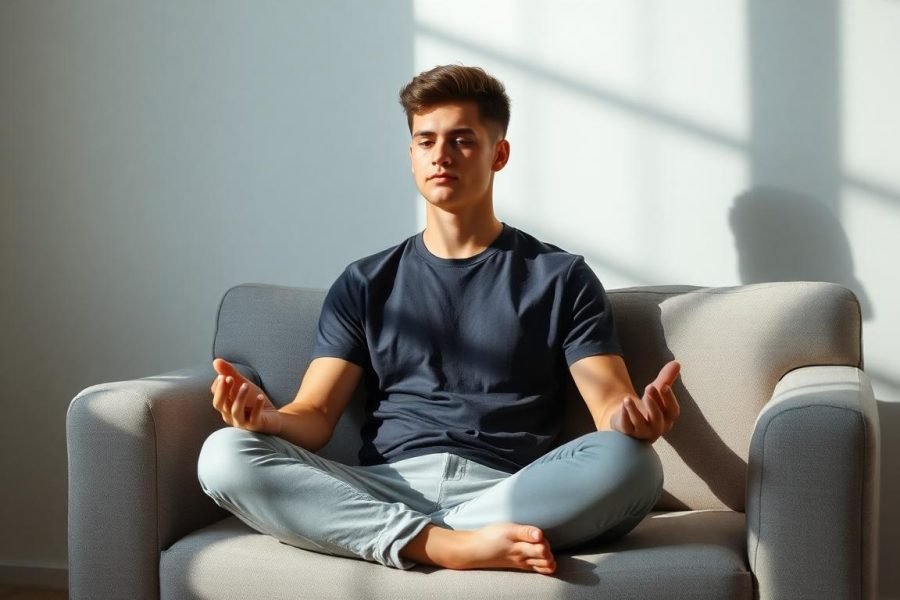

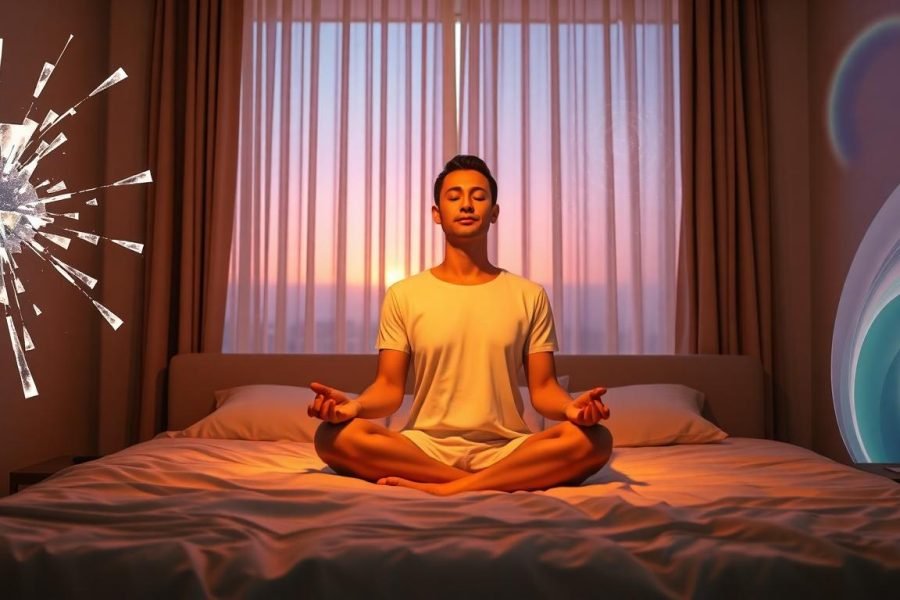
Deixe um comentário